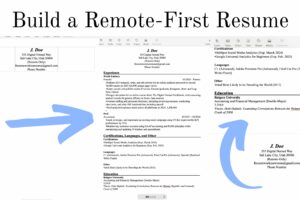Looking to start hiring globally? Or maybe your employee has approached you about working remotely? We cover how to post a remote-first job, converting an in-person job to remote, and how to save money!
Table of Contents
Intro for Employees
So, you have decided to become a digital nomad, maybe you are reexamining your work/life balance, or you need to take care of a sick relative. There are numerous reasons why people may need to transition from working in an office to remotely.
When starting these conversations about working remotely, it’s important to be realistic. Something is going to be sacrificed. For example, one of the proposals below is a reduction in salary. It will be hard to argue that you should receive the same salary living in Boise, Idaho as you currently do in Washington DC.
The best way to prepare for this… create a plan. A thirty-page document might not be necessary but at the minimum, you need to be able to answer the following questions.
- What are the potential downsides to working remotely?
You cannot just say, “I want to work remotely.” Approach your supervisor with a mitigation strategy for when things inevitably occur. Plus, the best arguments are crafted when you know your weaknesses.
- Can this job be completely remote?
External-facing positions such as PR, marketing, and sales rarely can be fully remote positions. It all depends on your industry.
Additionally, it is rare that leadership positions can be filled effectively remotely, unless everyone is remote.
- Employee Engagement
What is your goal of staying engaged? Most employers like to see dedication to the job, such as attending the annual Christmas party, happy hours, and the sort. (Whether they should care if you attend those voluntary points is moot.)
- What tools, systems equipment will the employer provide?
A lot of employers do not like sending computers and other equipment across the entire country or the world due to security problems. Also, does the company currently offer any project management software?
- Salary
What is the bare minimum you need for your job? Like I mentioned above, you will probably be asked to take a reduction in salary. One potential starting place to determine a fair wage could be the United States Government’s Office of Personnel and Management Locality Pay Tables.

Intro for Employers
If your employee has shared this article, hopefully they have addressed, at minimum, the five questions above. If so, you should have an answer. But there is one question that you should ask, too.
- Why does this employee wish to work remotely?
Is the employee moving to be closer to a sick family member? Is it during the holiday season, and this person just wishes to take some extra time? Or is the employee wanting to backpack around Europe and visit different countries?
9 Ways Hiring Remote Employees Benefits the Employer
Their goals may affect your answer, but here are ten reasons how remote work benefits the employer.
Employees are More Productive
There are thousands of different ways to gauge worker’s productivity, such as examining keyboard strokes, seeing how late they stay in the office, and just general productivity. However, within the typical 9 to 5, there are also major time sucks. Water cooler chats, random conversations with people who walk by, and just other unnecessary meetings distract your worker’s focus.
What if we removed all of those distractions, isolated the worker home alone, and gave them back time to do their work. It sounds glorious.
There are two suggestions that I would have.
- If you allow your worker to work remotely, focus on results-oriented projects.
- Establish a Core Working Time
Of course, you are going to still need to have meetings. However, that’s what the core hours are. Schedule sometime like 9AM-1PM, when the entire team must be online. Then, let the worker focus during times in which they are most productive.
Additionally, workers are much more likely to actually work past the clock at home, than they are if they are in a cubicle.
2. Reclassify Employees into Consultants
If you are a young-ish company or a start-up that has a slim margin, or maybe it requires lots of R&D for new products, there is one, albeit controversial, way to save cash. Instead of having full-time employees, you can reclassify them as consultants. The base salary is often significantly higher than full-time employees with benefits. However, you save money by avoiding the fees associated with employers.
In the United States, this might look like social security, medicare, and other wage taxes. Meanwhile, in the United Kingdom, this might look like reduced NHS taxes. In the USA, too, it is usually written off as an expense.

3. You Can Pay Employees Less
There are a couple of different ways you can save money by engaging with an all-remote team, too. The first is location-based salaries. The United States Federal Government has been working with this system for some time now. It makes sense, as somebody in New York City probably doesn’t not need the same salary as someone in Kansas to achieve a comparable lifestyle.
Here’s how it is done. There is a base salary, and then there is a cost-of-living adjustment as a percentage of the base salary. (Base Salary + Cost of Living Adjustment = Total Salary)
GS-07/09 are typically recent college graduates
GS-11 have 2+ years experience or a Master’s Degree
GS-13 have 6 years of experience or 4 + Masters
GS-14 + Have specialized Experience and 8+ Years
Operating Expenses
Operating expenses, also known as the cost of doing business, can drastically be reduced if you don’t supply the computers, don’t have an office or utilities cost, can deduct your home office from your taxes, etc.
Fringe Benefits
I’ve worked in the private and public sector, and I can tell you the fringe benefits of the private sector far outweigh the public sector. For example, working for the local government, they took the saying no such thing as a free lunch literally. We did not even have coffee in the office. So, you can save money in that way if you decide to allow your worker to try the remote lifestyle.
4. Wider Talent Pool
The recent automation push #AI slowed a recent, previous trend, acquiring talent from other parts of the globe. However, if you need a person-worker, there are a couple of ways to go about successfully posting a remote-first job.
- Create a solid job description, with the words remote-work or some combination of those in the first sentence.
- Click the description tag that actually says remote. Some potential workers will use this to filter out jobs.
- Post on your favorite job board. For a broad, international talent pool, most people will use Indeed. Otherwise, if you want a US or UK based worker, try LinkedIn.
- Examine the quality of applications, and don’t forget that you can post again if needed.
- Hiring Process..
- Interviews .. etc.
- Trial Phase
- Examine 3 Months Later
- If it goes well, become a thought leader in the space by sharing your story!
5. Emission Reduction & Eco-Friendliness
By going remote, you are actually promoting Eco friendliness. In rural areas, public transportation is rather lacking. Coal powered buildings are found in larger cities, but also water consumption and natural gas resources are reduced if employees are not there.
Finally, research has shown that people are more like to recycle at home, and some places in the UK even reported up to 100% more recycling during the lockdown.

6. Fewer sick days
From personal experience, I have found that remote work, or even the hybrid schedules, equates to less sick days.
Sometimes, people may not feel well. However, it’s the mental barricade of getting ready, commuting into the office with traffic, thought of getting other people sick, and staring at a computer for eight to ten hours makes you sicker.
Sometimes, it’s just anxiety or stress. But other times, this can actually make you worse.
If somebody is able to do their job from home, eat soup and drink coffee, and do other things like take medications without questioning, you would be surprised at the quality of work that can still be done.
7. Employees are Happier
You may not think that your employees should be content, but here’s where it matters. Your employees need to be happy, otherwise you will have to repeat the hiring process every six to eight months when someone leaves. Then, you need to train them. It really just is an annoying cycle.
Pay and hustle culture are not key, anymore. Instead, it’s freedom to spend time with the ones you love or doing the things you love.
8. Your Work-Life Balance
Let’s be honest. Employers and management are usually passionate about their business, as they should be.
Hours upon hours of unpaid work add up, however. If you have children, when was the last time you went to get an ice cream cone after a baseball game.
When was the last time you went to a non-work function, and actually had a meal that you paid for.
How is your relationship with your friend group? Do you even have a group of friends outside of work?
In order to be the best boss you can be, these are just some of the things you need to think about.
9. More Autonomy= Job Ownership
At the end of the day, employers want employees to take ownership for their actions. By allowing them some freedom and focus on project-based goals, they will become encouraged. Plus, they will become motivated to do a better job.
How to Convert an In-Person Job to Remote
- Begin the Conversation
- Assess the Current Remote Policy
For example, I have had one job that only allowed telework if people had doctor’s appointment. (It was rather an interesting place to work.) This data set should reveal some potential results to this new policy.
- Equipment; Technology Integration; etc.
- Trial Phase (Friday and Monday’s) For 2 Weeks
If the employee is in the office, try and see what happens if the employee works remotely. Don’t let your employee do the digital nomad lifestyle, either. If you do, the employee will actually treat the work time like a vacation with work instead of work with a vacation.
- Examine Productivity
It’s at this time that we can catch potential issues. We are still trying to collect information but talk about the ebbs and flows. What did the employee expect vs how did they actually perform.
- 3 Month Review: The Final Decision
At this point, you should know what works and what doesn’t. We need a large enough data set, and this should show what happens. At the very least, the completion of this experiment will show why remote work is not allowed per company policy.
Conclusion
It’s never easy to allow an employee to work remotely, but it’s also important to be fair. If you do this for one, others may question why it is allowed or not. I hope this article helped encourage you to take that first leap into remote work. But if it didn’t, as always, I’m available via email or comment section.






